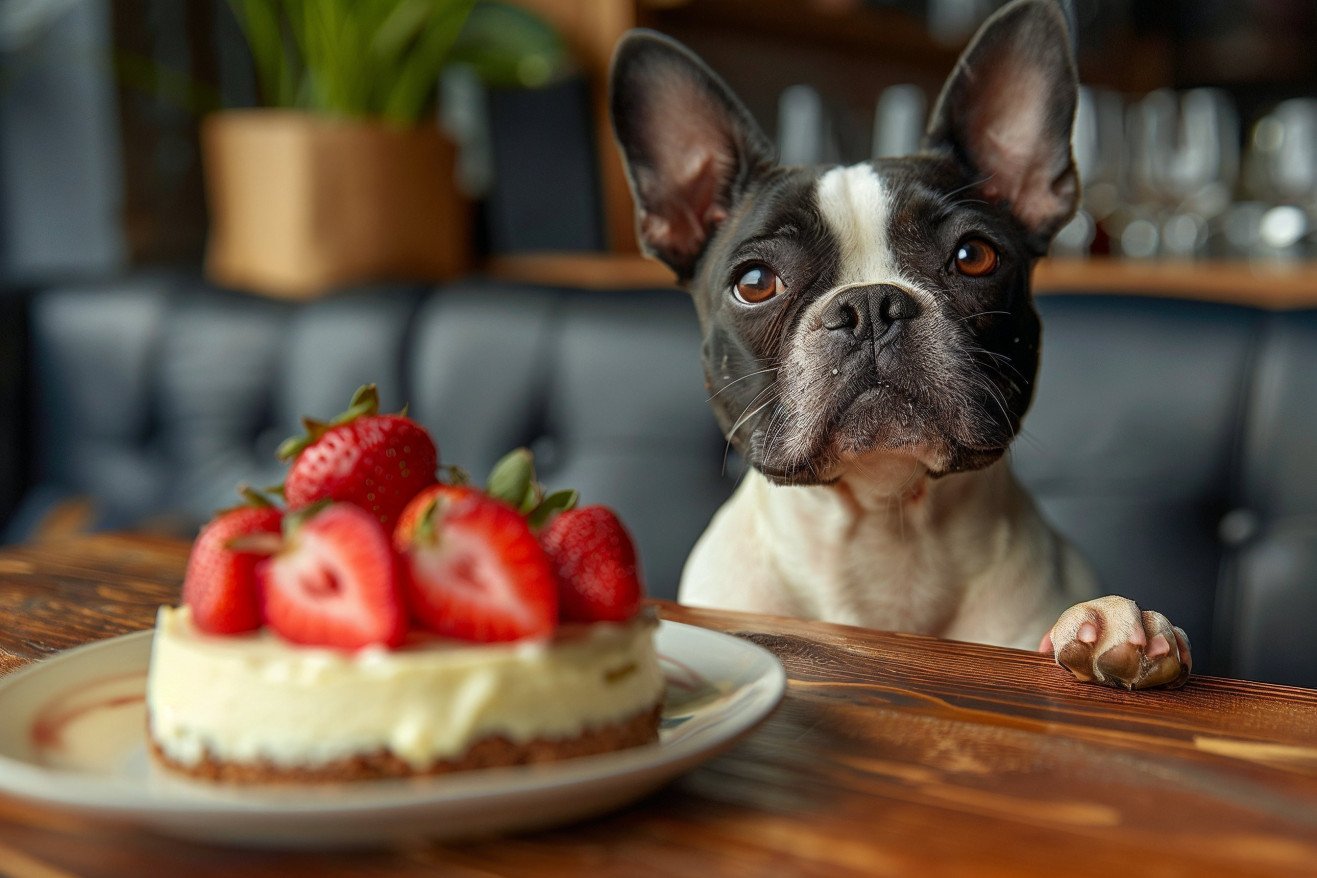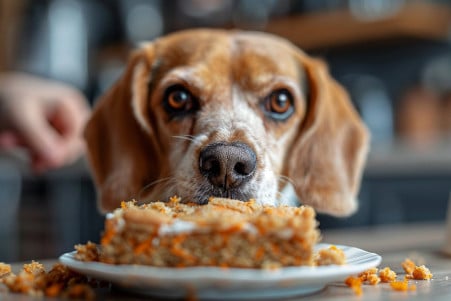Can Dogs Eat Cheesecake? Understanding the Risks and Alternatives
19 February 2024 • Updated 18 February 2024

While cheesecake is a beloved human dessert, it’s also a sweet treat that can be dangerous for your dog. Not only does cheesecake have high levels of sugar and fat, but it can also lead to lactose intolerance and it often contains toxic ingredients like xylitol. Although dogs can have small amounts of plain cheesecake on occasion, it’s better to give them fruits and vegetables as a healthier alternative.
This article will look at the risks of feeding cheesecake to dogs by reviewing veterinary research and nutritional information. It will specifically look at what causes lactose intolerance in dogs, the impact of sugar and fat on dogs, and the most common toxic ingredients found in desserts.
The article will also look at healthier alternatives to give dogs that will help support their health and the psychology of giving treats. This will help you better understand what’s best for your dog’s diet and health.
Can dogs eat cheesecake?
Knowing the Dangers of Sugar and Fat in Dog Cheesecake
While dog cheesecake may be a sweet indulgence, the sugar it contains can pose a risk to your pet. According to a report by Bond Vet, sugar isn’t toxic to dogs, but it can cause an imbalance in their gut bacteria, leading to symptoms like vomiting, diarrhea, and tummy upset.
In the long term, a diet high in sugar can also contribute to issues like obesity, diabetes, and dental problems. The same goes for fat. A study in PMC showed that high-fat diets can change the gut microbiota in dogs, and this could lead to imbalances that negatively affect their health.
These changes in the gut microbiome can cause problems like inflammation and metabolic diseases.
It’s important to know the signs of health issues caused by sugar and fat so you can catch them early. Keep an eye out for changes in your dog’s weight, energy levels, skin and coat health, and any signs of tummy upset.
Understanding the risks of sugar and fat in dog-friendly foods like cheesecake can help you make healthier choices for your dog’s diet. This knowledge is the first step in protecting your pet from the potential long-term health problems that can come from these ingredients.
Lactose Intolerance in Dogs
Lactose intolerance in dogs is caused by a deficiency of lactase, the enzyme that breaks down lactose, the sugar found in milk. According to a study by VCA Animal Hospitals, this can lead to gastrointestinal issues, including diarrhea and gas, especially when dogs consume dairy products. Cheesecake, which is full of dairy, is a big issue for dogs that are lactose intolerant, and it can lead to discomfort and digestive issues.
It is important to watch for signs of lactose intolerance after your dog has consumed dairy. As explained by Rover.com, Dr. Ari Aycock-Williams says that these signs include diarrhea, vomiting, bloating, and gas. These symptoms are often caused by the lactose that wasn’t digested in the small intestine moving into the colon, where it pulls in water and causes loose, watery stools.
If you think your dog is lactose intolerant, it’s important to carefully control the amount of dairy they consume. As explained by the American Kennel Club, small amounts of dairy may be OK for dogs that are lactose intolerant, but it’s best to find alternatives. Make sure to monitor your dog’s reaction to dairy to make sure it’s not causing any issues and consult your vet to determine the best course of action.
Toxic Ingredients to Look Out for in Cheesecake
While cheesecake may be a seemingly innocent treat, it can contain ingredients that are toxic to dogs. For example, xylitol, a sugar substitute found in some cheesecakes, can cause a rapid release of insulin in dogs, resulting in hypoglycemia, which can be life-threatening. The FDA warns that signs of xylitol poisoning in dogs can occur within 10 to 60 minutes of consumption or up to 12 to 24 hours later and include vomiting, weakness, lethargy, incoordination, and seizures.
Chocolate is another ingredient that can be especially dangerous. According to VCA Hospitals, chocolate contains theobromine, which can cause vomiting, diarrhea, and heart arrhythmias in dogs.
If your dog has eaten cheesecake that contains any of these toxic ingredients, it is important to get them to a veterinarian as soon as possible. Even small amounts of xylitol can cause liver failure and death in dogs. Macadamia nuts can cause weakness, hyperthermia, and tremors in dogs, according to the Merck Veterinary Manual, and raisins can cause sudden kidney failure in dogs, according to VCA Hospitals.
To avoid these situations, always check the ingredients in any human food before giving it to your dog. While it may seem like a small thing, this simple step can help you avoid a life-threatening situation and keep your dog healthy, setting you on a path to a happier life with safer, dog-friendly treat options.
Healthy and Safe Alternatives to Cheesecake for Your Dog
Instead of giving your dog cheesecake, there are many healthy and safe treats you can give them. Fruits and vegetables are full of important nutrients and don’t have the sugar, fat, and lactose that cheesecake does.
For example, apples (without seeds or the core, of course), as suggested by PetMD, are a great source of vitamin C and fiber, while blueberries are known for their antioxidants and vitamin C. Carrots, whether raw or cooked, are a good source of vitamin A and fiber, and they make a great crunchy treat.
These treats can be easily and enjoyably worked into your dog’s diet. For example, you can make peanut butter popsicles for a refreshing summer treat, as recommended by the Humane Society, or sweet potato jerky for a chewy, nutritious snack. Embrace Pet Insurance also notes that low-calorie treats like green beans and pumpkin can be helpful for dogs who need to lose weight.
That said, it’s important to remember that treats should be given in moderation. Both Raleigh Vet and Dr. Patty Khuly recommend that treats should only make up a small portion of a dog’s daily diet and not exceed 10% of their daily calories. By choosing a mix of these healthier treats, you can improve your dog’s diet and make the rewarding process safe and enjoyable for everyone.
Treats in Dog Training
In the world of dog training, treats are a big deal. The Humane Society of the United States points to the importance of treats in positive reinforcement training, which is a way to help dogs learn that good behavior will be rewarded.
It’s important that treats are given at the right time and consistently, meaning that they should be given immediately after the dog performs the desired behavior so that the dog can make the connection. Since dogs can’t understand complex language, it’s important that the trainer uses consistent verbal commands and body language.
That said, while there are many upsides to using treats in training, there are also some downsides, particularly when it comes to a dog’s health.
For example, it’s important that treats don’t make up more than 10% of a dog’s daily caloric intake, according to Preventive Vet.
It’s also important to make sure that the treats being used are healthy. It’s also important to make sure that dogs don’t become too reliant on treats, and that can be done by mixing treats with other rewards, like praise and toys. Dog owners who are able to do this successfully can help their dogs learn positive behaviors, keep their dogs healthy, and build a stronger relationship with their pets.
Choosing Healthy Treats for Your Dog
On the path of dog parenthood, knowing what we feed our pups is just as important as the love we give them. While cheesecake is a delicious treat for people, it can be very dangerous for dogs. The high sugar and fat content in cheesecake can lead to obesity and diabetes in dogs, and the ingredients xylitol, chocolate, and certain nuts are toxic to dogs.
In addition, the dairy in cheesecake can cause stomach issues in dogs that are lactose intolerant.
As responsible dog parents, it’s important to understand that dogs’ nutritional needs are very different from our own. Knowing the potential dangers of human food like cheesecake, we can make sure that we’re offering our dogs treats that are better for them. Healthy, safe alternatives like apple slices, bananas, and carrots can be just as enjoyable without the risks.
By being mindful of what we feed our dogs, we can make sure that we’re keeping them healthy and we can feel good about our choices. Let’s make sure that we’re giving treats in a responsible way that prioritizes health over a moment of indulgence so that we can make sure that our furry friends are around to enjoy life with us for as long as possible.


